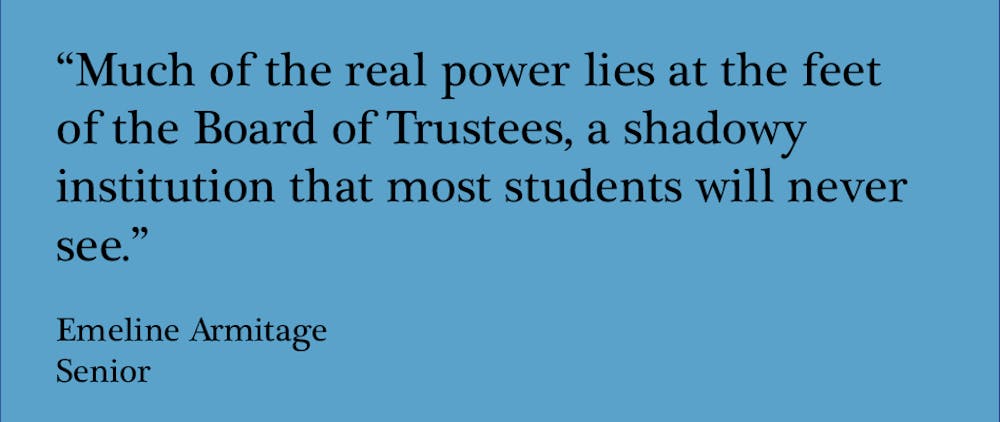The irony of being politically active in college is that once you get the hang of it, it’s time to graduate. I now know how to access the archives and notes of the Board of Trustees, how to navigate the Hydra head of bureaucracy that swallows student discontent, who is most effective to scream at and when, etc. Yet it is time for me to go, to take this useless knowledge and try to impart some to my younger fellow activists, to remember marching in Garland fondly years from now.
The fact that it took me four years to get a handle on Hopkins bureaucracy is by design. Books have been written about the bureaucratization of higher education, which serves a purpose in insulating the University from political pressure. When freshmen arrive on campus, the people that they see as authorities — residential advisors, professors, teaching assistants, even President Ron Daniels — are superficially in charge. Much of the real power lies at the feet of the Board of Trustees, a shadowy institution that most students will never see. So when we protest Daniels, or anyone in Garland, or generically protest at the Beach, we are using proxies to stand in for the Board.
In the 1980s, it was the Board of Trustees who dealt with anti-South African apartheid student activists. In the early 2000s, it was the Board who dealt with living wage campaigners. It was the Board who, in the early 2010s, dealt with the striking workers at the hospital. It was the Board who, in the mid-2010s, dealt with labor and union struggles with the subcontracted workers. It is the Board who now deals with calls to divest from fossil fuels and, god willing, in the future will have to deal with 1000s of other calls to end injustices. Chanting and waving signs at Ron Daniels or Daniel Ennis or Kevin Shollenberger or Sunil Kumar is just an attempt to penetrate the bureaucratic armor that protects the Board.
The obscuring of power plays into the tried-and-tested handbook of how to quell student unrest. When students make enough of a fuss, form a committee or have a forum; make promises and hold “dialogue” into the springtime. By then, the most experienced student activists will be graduating, the committees and forums can wither away into obscurity over the summer, and the fall can start anew with no pesky student grievances. And so I now have to ask myself: What was the purpose of gaining this knowledge? Of yelling and waving signs in Garland several times a year for various causes? Of course, some of it was for the adolescent thrill of sticking it to authority, but a part of me believed, and believes, that student activists can make positive differences by making good on threats of unrest.
Vice Provost for Student Affairs Kevin Shollenberger once said to me with a wry grin, “I used to think I was fighting ‘the man’ in college, but now I feel like I am ‘the man.’” The buttoned-up corporate drone regaling people with tales of his radical college youth is a popular trope in TV and movies. The majority of the former leaders of the violently radical Weather Underground are now professors who do community gardening on the weekend. The fear of “selling out,” though admittedly juvenile, is palpable.
The fear rises as the day of graduation creeps nearer and the need to find full-time employment approaches. My degrees lend themselves to jobs with the CIA, the State Department, the FBI — basically all the institutions I’ve spent four years shouting about. I am committed to remaining politically active and to finding a job that doesn’t have me laying fitfully awake at night terrified for my immortal soul. But the shadow of “former college radical” still looms above my head.
My fondest memories of Hopkins are the ones I spent politically active, yelling about the injustices that Hopkins commits. I ask myself if this is hypocritical — surely I should be organizing because I believe in the cause, and I should be sacrificing time and resources for things I believe in, not to gain enjoyment! And believe me, it hasn’t all been easy — the vast majority of political work is grueling behind-the-scenes logistics, and I’ve received considerable harassment because I’ve been outspoken about certain issues. But the satisfaction from fighting for a cause and occasionally making gains, is unparalleled.
And so, if I may be so arrogant as to offer advice to my younger campus political activists: Stick to your values. Take the lumps and the bruises and use them as fuel. It’s grueling, it’s difficult, it’s infuriating. You’ll cry, you’ll scream, you’ll feel hopeless. Even in fleeting moments of hope, you’ll know that they might just be fleeting. But you must try to push on. Lord knows I will.
Emeline Armitage is a senior International Studies, Latin American studies and Spanish major. She is from Cleveland, Ohio.





